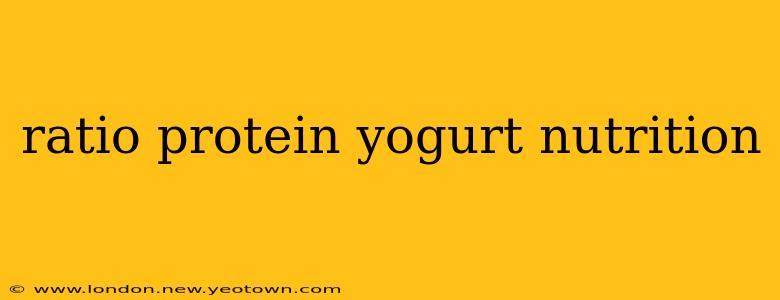Yogurt. That creamy, cool comfort food we all love. But beyond its delightful taste lies a nutritional powerhouse, particularly when it comes to protein. Understanding the protein content in your yogurt is key to making informed choices for a healthy lifestyle. This comprehensive guide will unravel the mysteries of yogurt's protein ratio and help you navigate the world of this versatile dairy product.
Let's start our journey by exploring the fundamental question:
What is the typical protein ratio in yogurt?
The protein content in yogurt varies wildly depending on several factors, including the type of milk used (cow's milk, goat's milk, soy milk, etc.), the yogurt's fat content (full-fat, low-fat, non-fat), and the manufacturing process. Generally, a single serving (around 6 ounces or 170 grams) of plain, non-fat yogurt can contain anywhere from 10 to 15 grams of protein. Greek yogurt, known for its thicker texture and tangier flavor, often boasts a significantly higher protein content, sometimes reaching 20 grams or more per serving. However, always check the nutrition label, as this is the only reliable source of information for a specific product.
Now, let's delve into some frequently asked questions surrounding yogurt's protein profile:
How much protein is in a typical serving of yogurt?
As mentioned earlier, a typical serving of plain, non-fat yogurt contains roughly 10-15 grams of protein. Greek yogurt often surpasses this, offering 20 grams or more in a similar serving size. Flavored yogurts can vary, sometimes having slightly less protein due to the addition of sugars and other ingredients. Remember to always check the nutrition facts panel on the yogurt container for precise information.
What are the benefits of eating yogurt with high protein?
High-protein yogurt offers a multitude of health benefits. Protein is essential for building and repairing tissues, supporting muscle growth, and boosting metabolism. Consuming adequate protein can contribute to feelings of fullness and satiety, aiding in weight management. Furthermore, yogurt is a rich source of calcium and other essential nutrients, contributing to overall well-being.
Is Greek yogurt higher in protein than regular yogurt?
Yes, absolutely! Greek yogurt is typically significantly higher in protein than regular yogurt. This is because the whey and some of the liquid is strained out during the manufacturing process, leaving a more concentrated protein source. This straining process also gives Greek yogurt its characteristically thick texture.
How does protein in yogurt compare to other protein sources?
Compared to other protein sources like meat or eggs, yogurt provides a more moderate amount of protein per serving. However, its advantages lie in its accessibility, versatility, and the additional nutritional benefits it offers beyond protein. It's a great addition to a balanced diet, complementing other protein sources rather than necessarily replacing them entirely.
What type of yogurt has the most protein?
Generally, plain, full-fat Greek yogurt tends to have the highest protein content. However, this can vary between brands and specific products. Always check the nutrition facts label to confirm the protein content before making a purchase. Remember to read the ingredient list too!
Can I increase the protein in my yogurt?
Yes! You can easily boost the protein content of your yogurt by adding protein-rich ingredients like nuts, seeds, granola (in moderation), or even a scoop of protein powder. This can turn a simple snack into a protein-packed powerhouse, perfect for post-workout recovery or a filling breakfast.
In conclusion, the protein content in yogurt is a variable influenced by several factors. Always refer to the nutrition label for accurate information, and choose the type of yogurt that best fits your dietary needs and preferences. With its versatility and significant nutritional value, yogurt remains a delicious and valuable addition to a healthy diet. So, grab a spoonful and enjoy the protein-packed goodness!

